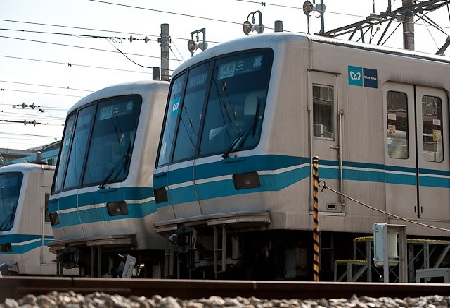
Tokyo Metro Jumps 47.3% on Debut in Japan's Largest IPO in Six Years

 Tokyo Metro Co. made a strong debut on the Tokyo stock market, briefly jumping 47.3% above its offering price of 1,200 yen ($7.9), pushing its market capitalization past 1 trillion yen in Japan's largest initial public offering in six years. The stock price of Asia's oldest subway operator closed at 1,739 yen, after opening at 1,630 yen on its first day of trading on the Tokyo Stock Exchange's Prime Market.
Tokyo Metro Co. made a strong debut on the Tokyo stock market, briefly jumping 47.3% above its offering price of 1,200 yen ($7.9), pushing its market capitalization past 1 trillion yen in Japan's largest initial public offering in six years. The stock price of Asia's oldest subway operator closed at 1,739 yen, after opening at 1,630 yen on its first day of trading on the Tokyo Stock Exchange's Prime Market.
Tokyo Metro, the country's second-largest railway company by passenger volume, drew massive buy orders primarily from individual investors seeking stability and dividends. It took around an hour to reach the initial price after the market opened at 9 a.m.
The subway operator raised 348.6 billion yen in the IPO, with the central government and the Tokyo government selling half of their respective holdings of 53.4 percent and 46.6 percent at 1,200 yen per share.
The central government will use its proceeds from the sale of Tokyo Metro shares to repay bonds issued to fund reconstruction efforts following the devastating earthquake and ensuing tsunami that struck northeastern Japan in March 2011.
Tokyo Metro was formed in 2004 from a public sector-backed entity as part of privatization efforts, though all of its shares had been held by the central and metropolitan governments.
Both the market capitalization and the value of Tokyo Metro's share offering are the largest in Japan since SoftBank Group Corp. listed its telecom unit in December 2018, which had a market value of 7.18 trillion yen, according to data provider Dealogic. SoftBank Group raised 2.65 trillion yen in what remains Japan's biggest-ever IPO.
"Demand for Tokyo Metro's shares among individual investors appears to be robust due to its stable earnings and favorable dividend yield", said Shingo Ide, chief equity strategist at the NLI Research Institute.
The dividend per share is estimated at 40 yen for the business year ending in March 2025, setting the dividend yield at 3.3 percent based on the offering price.
However, Ide warned that the subway operator's stock may be sold after initial buying subsides, as the dividend yield has dropped below 3 percent as a result of the price gain.
Tokyo Metro operates nine subway lines connecting 180 stations across the capital and carried 1.9 billion passengers in the year ended March 2022, the second highest after East Japan Railway Co. Its operations also include real estate, retail and telecommunications businesses.
"We do not expect significant growth potential for Tokyo Metro, as it is challenging to build new lines and boost earnings from its real estate business, unlike rival companies", Ide added.

